Psychiatric Services
- Volume 72
- Number 2
- February 2021
Taking Issue
Articles
Publication date: 03 December 2020
Pages122–128Objective: The authors sought to quantify the rates of psychological distress among health care workers (HCWs) during the COVID-19 pandemic and to identify job-related and personal risk and protective factors. Methods: From April 1 to April 28, 2020, the ...
https://doi.org/10.1176/appi.ps.202000424Publication date: 03 November 2020
Pages129–135Objective: There is significant debate about the feasibility of using predictive models for suicide prevention. Although statistical considerations have received careful attention, patient perspectives have not been examined. This study collected feedback ...
https://doi.org/10.1176/appi.ps.202000092Publication date: 25 November 2020
Pages136–142Objective: Ending Self-Stigma is a nine-session group intervention designed to teach individuals experiencing mental illness a set of tools and strategies to effectively deal with self-stigma and its effects. The authors examined the efficacy of Ending ...
https://doi.org/10.1176/appi.ps.201900296Publication date: 23 September 2020
Pages143–147Objective: For individuals with serious mental illness, work can play an important role in improving quality of life and community integration. Since the 1960s, demand has shifted away from routine cognitive (e.g., clerical work) and manual skills (...
https://doi.org/10.1176/appi.ps.202000243Publication date: 03 December 2020
Pages148–155Objective: Research has examined the effect of Medicaid expansion on access to physicians with buprenorphine waivers, but less attention has been paid to Medicaid’s impact on opioid use disorder medication availability within the specialty substance use ...
https://doi.org/10.1176/appi.ps.202000049Publication date: 25 November 2020
Pages156–162Objective: Persons with mental illness have poorer oral health and are less likely to receive oral health care than those in the general population. A comprehensive understanding of barriers to and facilitators of accessing oral health care from a ...
https://doi.org/10.1176/appi.ps.201900535Publication date: 18 December 2020
Pages163–168Objective: The authors evaluated suicide risk rates detected via a depression screener administered within a large pediatric primary care system and examined 1-year follow-up care after adolescents’ endorsement of suicide risk. Methods: Retrospective ...
https://doi.org/10.1176/appi.ps.202000207Special Articles
Publication date: 29 September 2020
Pages169–173National, state, and local actors seem ready to address the long-neglected mental health crisis system in the United States. Elements of an organized system of crisis care are in place in some states, including regional or statewide call centers, mobile ...
https://doi.org/10.1176/appi.ps.202000114Publication date: 03 September 2020
Pages174–179The U.S. suicide rate continues to increase, despite federal investment in developing preventive behavioral health care interventions. Important determinants of suicide—social, economic, and circumstantial—have little or no connection to psychopathology. ...
https://doi.org/10.1176/appi.ps.202000317Publication date: 03 December 2020
Pages180–185A strengthened evidence base and earmarked federal funding have spurred the implementation of coordinated specialty care (CSC) for people experiencing early psychosis. However, existing funding mechanisms are insufficient and unsustainable to support ...
https://doi.org/10.1176/appi.ps.202000129Publication date: 10 November 2020
Pages186–194Researchers increasingly recognize that stakeholder involvement enhances research relevance and validity. However, reports of patient engagement in research that relies on administrative records data are rare. The authors’ collaborative project combined ...
https://doi.org/10.1176/appi.ps.202000177Brief Reports
Publication date: 09 December 2020
Pages195–199Objective: Cost, distance, and stigma may present barriers to face-to-face treatment for anxiety disorders. Technology can help overcome these barriers. The evidence map presented here provides an overview of technology use in clinical care for anxiety. ...
https://doi.org/10.1176/appi.ps.202000178Publication date: 18 December 2020
Pages200–203Objective: Using 2019 Centers for Medicare and Medicaid Services data, the authors analyzed performance on behavioral health care quality measures among 168 marketplace insurers offering 185 products and investigated whether performance differed by insurer ...
https://doi.org/10.1176/appi.ps.202000115Publication date: 18 December 2020
Pages204–208Objective: The authors sought to describe changes in availability of crisis and substance use treatment services in U.S. mental health facilities (including outpatient and inpatient facilities) from 2010 to 2017. Methods: Using National Mental Health ...
https://doi.org/10.1176/appi.ps.201900546Open Forum
Publication date: 04 August 2020
Pages210–212Across the United States, state laws most commonly limit the duration of emergency psychiatric holds to 72 hours. Estimates suggest that more than 1 million emergency psychiatric holds are placed in the United States each year, and this 72-hour limit can ...
https://doi.org/10.1176/appi.ps.202000284Publication date: 19 November 2020
Pages213–215To improve care, clinicians should seek to eliminate defects in behavioral health systems. The proposed framework to eliminate defects has three parts: designing a vision for defect-free care, designing analytics to guide care delivery, and identifying ...
https://doi.org/10.1176/appi.ps.202000255Publication date: 14 October 2020
Pages216–218Psychiatric advance directives (PADs) allow service users to participate in their own mental health care in the event that they have a future mental health crisis and are deemed incompetent to make decisions, but few patients complete these documents. ...
https://doi.org/10.1176/appi.ps.202000080Publication date: 18 December 2020
Pages219–221Psychiatric advance directives (PADs) can help adults with serious mental illnesses preserve their autonomy and avoid involuntary interventions during an incapacitating mental health crisis. A PAD is a legal document prepared while mentally competent and ...
https://doi.org/10.1176/appi.ps.202000659Publication date: 03 November 2020
Pages222–224About 46.6 million Americans have mental illnesses, yet profound treatment gaps exist in this country. Among those receiving treatment, most are treated solely with medication, even though >50% prefer to include psychotherapy in treatment. Other countries ...
https://doi.org/10.1176/appi.ps.202000220Datapoints
Personal Accounts
Frontline Reports
Letters
Editor’s Choice
Past Issues
View Issues Archive
Vol. 76 | No. 1

Vol. 75 | No. 12

Vol. 75 | No. 11
